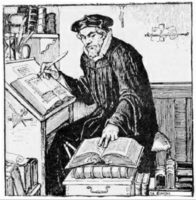
Turku, Finland
Dr. Stephen Nichols introduces us to a farmer from Finland who gained the respect of Martin Luther.
We are making our tour around unlikely places where the Reformation occurred. Last week we were in Seville, Spain, and now we’re heading to the east and north. We are in Turku, Finland. This is the story of Michael Agricola. He was born in 1507 and he died in 1557. His Latin name, Agricola, means “a farmer,” and it was a name he took when he became a student. So, we’re talking about Michael the farmer from Turku, Finland.
 In 1536, Agricola was sent to study at Wittenberg. He had shown much promise as a student and was very capable at the languages and learning. He was ordained as a priest and made his way up the ranks. It was decided that he would go to Wittenberg and there study under Martin Luther and Philip Melanchthon. In 1539, he received his master’s degree from Wittenberg. He got quite an education, as you can imagine. He left Wittenberg with two letters of endorsement— one from Martin Luther and one from Philip Melanchthon— and he headed home to Finland.
In 1536, Agricola was sent to study at Wittenberg. He had shown much promise as a student and was very capable at the languages and learning. He was ordained as a priest and made his way up the ranks. It was decided that he would go to Wittenberg and there study under Martin Luther and Philip Melanchthon. In 1539, he received his master’s degree from Wittenberg. He got quite an education, as you can imagine. He left Wittenberg with two letters of endorsement— one from Martin Luther and one from Philip Melanchthon— and he headed home to Finland.
He immediately began to teach, preach, and write the ideas of the Reformation. In 1543, he published his first book which was an ABC’s book for kids. Luther had done a similar book written in German, and so Agricola was doing this now for Finnish kids. In 1545, he published a prayer book. But his main work that brought the Reformation to Finland was published in 1548, and this was the New Testament in the Finnish language. He initially tried for years to get the King of Sweden to finance the project. At this time in Finland’s history, the Swedish King ruled over the Finnish people. His efforts to the king were to no avail, so he ended up financing it himself with the help of a few others. In 1548, the first copy of his three-hundred-and-fifty-page New Testament, complete with illustrations, came off the printing press and made its way around Finland.
In 1550, Agricola married Birgitta Olavintytär and they had one son together. They named him Christian Agricola. Agricola, the father, became a Lutheran bishop in 1554. His son, Christian, would later also become a Lutheran bishop and became a leader of the second generation of the Finnish Reformation.
Now back to the father, Michael Agricola. In 1556 and 1557 there were border disputes between Finland and the Russians, and things were heating up. This is the time of Ivan the Terrible in Russia. The Finnish officials and the Swedish King decided that a delegation should go to Moscow and try to negotiate a peace treaty. Agricola was one of the one hundred men of this delegation. They made the long journey from Turku, Finland all the way to Moscow, which was about eight hundred miles. And they did it in the dead of winter. The delegation arrived in Moscow in February and they were there until March. After a month of negotiations, they were able to hammer out a peace treaty for these borderlands between Finland and Russia.
Then they had to make the long journey back. It took the party three long weeks to travel all the way back from Moscow to Turku, and Michael Agricola did not make it. Somewhere along the way he took ill, and on April 9, 1557, Michael Agricola died after fifty years of life. He was the Reformer in Turku, Finland.
Stay connected with 5 Minutes in Church History by getting the weekly podcast on iTunes, SoundCloud, or via RSS. You can also subscribe to the blog via RSS and follow us on Twitter and Facebook.
(This podcast is by Ligonier Ministries. Discovered by Christian Podcast Central and our community — copyright is owned by the publisher, not Christian Podcast Central, and audio is streamed directly from their servers.)